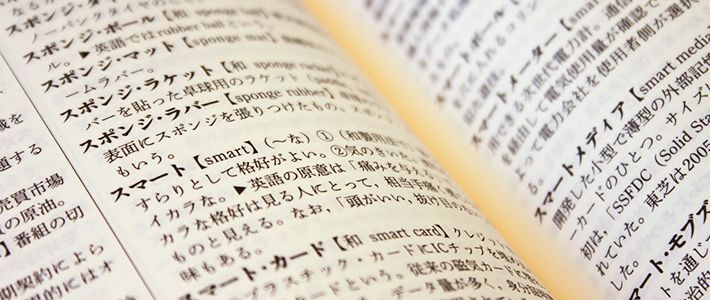
Are Loanwords a Threat to the Japanese Language?
Society Lifestyle- English
- 日本語
- 简体字
- 繁體字
- Français
- Español
- العربية
- Русский
One day as I was traveling to work on the train, I overheard a pair of what must have been junior high school students talking to each other in Japanese. “Hey! Your clothes are so nostalgic,” one said to the other, using the loanword nosutarujikku. I could not help but doubt whether such young boys would know anything about nostalgia.
Loanwords are seen and heard everywhere in Japan. Their extensive use on NHK even prompted a 71-year-old man to seek compensation from the public broadcaster in 2013 for the emotional distress caused by the inordinate use of English terms on the air. He claimed that his inability to comprehend adopted words—such as those based on “concierge,” “risk,” “care,” and “trouble”—led to stress as he could not understand the content of programs.
A Flood of Foreign Vocabulary
Many early loanwords into Japanese were taken from Portuguese and Dutch, but now the vast majority of imports come from English. Some words change their meanings when they enter the language. For example, rather than referring to someone who is intelligent or well turned out, “smart” in its Japanese form sumāto means “slim.” Strawberry as a fruit is ichigo in Japanese, but when talking about the flavor of ice cream or gum, the loanword sutoroberī is more common.
I see no problem at all with borrowing a foreign word when an equivalent does not exist in the Japanese language. It seems totally unnecessary, however, to add new terms when there are perfectly good words already available in the native tongue.
Japanese currently consists of around 33% words of Japanese origin (wago), 49% words of Chinese origin (kango) and 18% loanwords from other languages (including words of mixed origin and the made-in-Japan pseudo-English known as wasei eigo). Foreign vocabulary floods into the language in every field via every kind of medium, from Internet slang to film titles. I do not deny that new terms can supplement and enrich, but I am concerned that their overuse could drown out perfectly good Japanese expressions.
Do Imports Have Higher Status?
Plants and fish of foreign origin that threaten the native population are usually called “invasive species” and are regarded as undesirable intruders. Although loanwords would appear to be the linguistic equivalent of such unwanted encroachment, the term does not carry the same sense of menace.
Are loanwords really that cool or sophisticated? Is Japanese an embarrassingly awkward language? Does the use of imported terms confer status on the speaker? In 2002, the National Institute for Japanese Language and Linguistics established a Loanword Committee, which proposed Japanese substitutes and explanations to use instead of some 176 imported terms that were difficult to understand. Unfortunately, this move elicited very little response.
The sixth edition of the Kōjien, considered the most authoritative dictionary of Japanese, contains a total of 240,000 words. Meanwhile, publisher Sanseidō’s Konsaisu katakanago jiten (Concise Dictionary of Katakana Words) includes 56,300 terms, of which 8,200 are abbreviations based on the Roman alphabet. This suggests that roughly one in five words in Japanese are loanwords, whose rising share is bringing about fundamental changes in the language.
Although I love the Japanese language with a passion, as an outsider I am not presumptuous enough to insist that it be protected or to warn the Japanese people that it is losing its essential qualities. I would, however, encourage the ministry of education to take the lead in encouraging native vocabulary mastery at an early stage, such as at junior high school. I also suggest that TV quiz shows could stimulate knowledge of Japanese words by setting questions that require them to be substituted for katakana terms. These measures would hopefully go some way to mitigate the excessive reliance on loanwords in Japan.
(Originally published in Arabic on July 9, 2014. Banner photo: The loanword “smart” from Katakana gairaigo ryakugo jiten [Dictionary of Katakana Loanwords and Abbreviations].)